Zhiyembet-zhyrau
Zhiyembet Bortogashuly (date of birth and death are unknown), was the Kazakh poet storyteller lived in the end of XVI and in the first half of the XVII century. Was a head of Alshyn tribe.
Zhiyembet-zhyrau played an appreciable role in internal and foreign affairs of life of the Kazakh people. Under Esim khan Zhiyembet-zhyrau was rich and the commander-batyr of Younger zhuz. In 1620-1627 he participated in campaigns against Kalmyks, distinguish himself in action, a stir personal heroism and uncommon organizing abilities.
Zhiyembet-zhyrau was one of outstanding personalities of the Kazakh history, he became truly national leader. In war against Oirats in 1620 he headed an army of Younger zhuz and played a big role in a victory of the Kazakhs.
In 1628 Zhiyembet-zhyrau showed tireless energy in preservation of unity of the people. Together with Esim khan he calmed down the revolt lifted by the khan Tursyn that wanted to leave structure of the Kazakh khanate and to govern independently. Subsequently Esim khan, being afraid of influence which had Zhiyembet on Younger zhuz, banished him with his brother Zholymbet on the deserted island. It seems that Zhiyembet-zhyrau was a proud person, didn’t afraid of disgrace of the khan. Being exiled on the unknown island, he was not afraid to state in Esim khan’s face everything that he thought of him: «Brave Esim-giant! You revel in glory. Bridle the arrogance - mine to you council! ». On one data, Zhiyembet-zhyrau died in exile. On another - he returned to the native land after Esim khan’s death. But after the death of Esim khan in 1643 there are no data about Zhiyembet-zhyrau.
The works which have reached us of Zhiyembet-zhyrau say that he was a skillful poet, a master of poetic word. In such songs as «Reflections about Esim khan», «My hands and feet are in fetters», etc., the poet expresses the mood and an internal state of mind. Works of Zhiyembet-zhyrau have big historical and ethnographic value.
Share:









